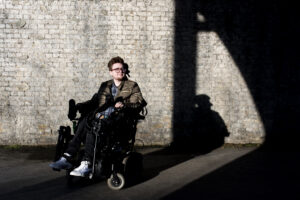
For me, the hardest thing about living with progressive impairment rather than the static impairment I hoped I had is that shifting relationship with the ground. Just as I know what I can do, and what I can expect, this is thrown into relief by a new problem cropping up out of nowhere. I thought I knew what was wrong, then last spring I developed a life-threatening hormone imbalance that I had known nothing about – hadn’t even realised that bit of me could break. There’s always something in flux, something that startles me with how it changes. I have been gifted with an intimate relationship with the decomposition of my body.
Adaption = grief + pragmatism
Adaption means acknowledging the loss, and the grief, and moving forward. It means making room in my heart for feelings I think will eat me alive. I cannot adapt without accepting the grief. I cannot let the grief swallow me. Therefore I must be pragmatic, layer that on top of grieving. I allow it this room in my head and no more. I let it sit with me, and then tell it: enough. I must walk the dog. My catheter bag is screaming. I tell this to my head, and I let life take over. It is hard to dwell on grief when life keeps demanding that I move on with it. This has saved me many times.
This tension between dwelling and ignoring is a balancing act I struggle with. It’s something I want to balance, it’s something which balances me on a wire. I can’t stumble too much to one side or another without losing the beauty and the creativity which grows out of complexity for me. I resist simple narratives.
Pragmatism = adaption – grief
There is no room for lazy grieving amidst my pragmatism. Grief is removed from the adaption that it shades in bluish greys, the colour of a squawking pidgeon – beauty and annoyance all in one structure.
Pragmatism is what keeps me plodding forward. It is pragmatism that pays the rent early, the night before a medical procedure, when I am up late anxiously awaiting what the morning brings. Pragmatism does these things, because she knows that come what may, the jobs need doing. I learned this from my mother – whatever was going on in her life, the kitchen floor stayed scrubbed. Well, mine isn’t, but the principle’s the same, even if I live in a hoarder’s paradise – boxes of meal replacement and catheter supplies lining the walls, even if I come from a generation that buys and discards possessions freely, rather than staying up late darning ripped bedsheets.
So the rent is paid, though there is little risk of something going wrong. Pragmatism winning out.
Grief = adaption – pragmatism
This part of the equation seems odd, but grief is the process of adaption when I’m not able to be pragmatic. Grief is watching my life be adapted by progression, when I can’t make the decisions that keep me plodding on. Grief was the wheelchair services wheelchair that was never supportive enough, and whose sight I hated, for the ugliness. Grief is the changing boundaries of my body, without the knowledge that I can move forward. Grief is counting the losses, and not counting the friendships, knowledge, or experiences I’ve gained.
How do we talk about grief as disabled people? Writing about disability I wish to stake my claim to joy – say “I flew here, as free as a kite, and was happy”. I wish to call from the rooftops that this relationship is here with my body. I wish to tell the world that I was here, and I was happy. I will not let someone write tragedy on my body, and sell a package in one dimension. I will not be your inspiration for existing.
Disabled people whisper the harder parts in condition-specific groups, or one on one. A nevous confession of the frailties of our bodies. Discussing the misery of transferring to ‘accessible’ toilets with no hoist, the depression that can eat you at night, untreated pain and bodies that slow early.
I acknowledge the grief of my legs not responding when I ask for movement, but that grief is tempered and strengthened by the rage of broken lifts. Both are real pains. I cook food I will never taste.
Adaption, grief, and pragmatism are inseparable
They work towards a solution for me where I can be a whole person – acknowledge what my body is doing, acknowledge what society has done to me. Losing any part of that equation means losing myself – whether I subsume my emotions or my desire to live in the world, I cannot adapt without holding both those things.
There is no shame in grieving. There is no shame in changing your life. There is no shame in pragmatism. There is no shame in survival. There is no shame, eventually, in no longer surviving.